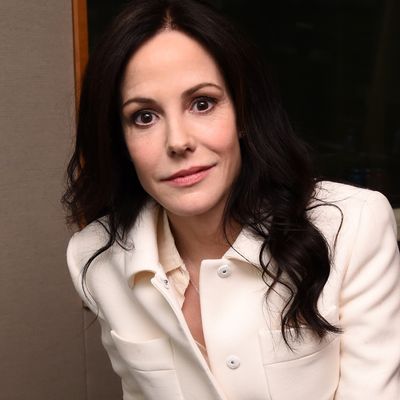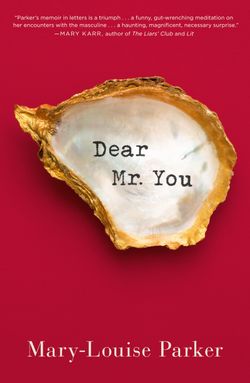
In Mary-Louise ParkerÔÇÖs first book, Dear Mr. You, boys are definitely not on the side, to paraphrase the title of one of her best-known movies. In fact, boys ÔÇö well, men, really ÔÇö are front and center in this lapidary, memoir-ish book, in which the Tony- and Emmy-winning actress has written letters to 33 men who have made an impact on her life. There are letters to friends, lovers (good and bad), family members (especially her late father), inspirations (a Yaqui tribal dancer, a latter-day hippie), strangers (a fireman in the aftermath of 9/11, an oyster picker), and professionals (her accountant, the doctor who saved her life, a delivery-room orderly), all of whom she looks upon with gratitude.
Talk about the book with Parker and sheÔÇÖll return to that word, gratitude, repeatedly, using it to describe how she feels about these men she has known. The collection, which was released this week, is about as far from a celebrity memoir as you can get, but trust the star of Angels in America and Weeds to write a book that is closer to Elizabeth HardwickÔÇÖs Sleepless Nights than a behind-the-scenes Hollywood tell-all. In fact, it contains almost nothing of show business, with virtually no bold-faced names mentioned.
Below, you can hear Parker read a story from the book, ÔÇ£Dear Gorgeous,ÔÇØ and then learn more about how the book came together and the role that writing plays in ParkerÔÇÖs life.
***
Why letters to men exclusively?
I appreciate men and I am a romantic. And I feel like IÔÇÖve had a lot of varied experiences with men. IÔÇÖm older now, you know, 51 years old, and IÔÇÖve lived a lot of my life with men. Really interesting, heroic men. Difficult men. And brilliant men. And I liked being able to kind of celebrate that.
Have long have you been writing?
I always wrote when I was little. I always wrote poetry, for somebodyÔÇÖs birthday or for a boyfriend, and short stories. Then somebody asked me to write something for a magazine and I wrote it. And then I wrote another piece. And then I was asked to write for Esquire. I loved writing for that magazine. It gave me so many opportunities to write.

Did Esquire play any part in the creation of this book?
One of the larger pieces I wrote for the magazine was about my dad. Then they asked me to write about men in general and it came out in letter form. It was just this invocation, which is the beginning of the book now. I just completely loved writing it ÔÇö I loved the directness of it. I felt free to be as poetic as I wanted to, or as specific or abstract or mundane. But I had a word count, you know, because this is a magazine. The piece about my dad wasnÔÇÖt a letter. But I felt like that piece and the invocation were the beginnings of something. Then I experimented and wrote that letter to my accountant. And then I met Eric Simonoff, whoÔÇÖs my agent, and he helped me distill it into the idea. Because I was saying to him, ÔÇ£Does this make sense?ÔÇØ And he said, ÔÇ£Yes, you should try to do it.ÔÇØ
What is your process?
Well, I turn on the Disney Channel and have my children crawl all over me and then have my dog walk on the computer and erase everything I wrote. I didnÔÇÖt have ideal conditions writing this book. But I can write almost anywhere if I know where IÔÇÖm going.
Your book is about men, yet is dedicated to your mother.
SheÔÇÖs quite represented in the letter ÔÇ£Dear Orderly,ÔÇØ because I talk about the mother I want to be. And in ÔÇ£Dear DaddyÔÇØ and ÔÇ£Dear Oyster Picker.ÔÇØ SheÔÇÖs in some way peripheral, but that was a big statement I made by dedicating the book to her. My father would have loved that. He thought the sun rose and set with her. My father appreciated her in a way that was pure. They were married 64 years. So people say, ÔÇ£WeÔÇÖve been going through a rough patch, weÔÇÖve had hard years.ÔÇØ Well, my parents had a rough patch that lasted decades, and in the end, they were just in love and devoted to one another. ItÔÇÖs definitely the exception and IÔÇÖve only seen it a handful of times and itÔÇÖs inspiring.
On your book tour, you are appearing several times with Mary Karr, author of The LiarÔÇÖs Club. How did this come about?
WeÔÇÖve been friends and weÔÇÖve been working on a project together, but I donÔÇÖt know if it will happen. I love her books. SheÔÇÖs one of my favorite writers and one of my favorite poets. SheÔÇÖs smart, and as tender as she is tough, and generous as can be. SheÔÇÖs worth listening to as a person. Hopefully I can just let her talk. SheÔÇÖs about a zillion times more interesting than I am.
In your acknowledgments, you thanked the late Mark Strand. What kind of relationship did you have with him?
HeÔÇÖs my favorite poet. One time in my life I was not having a good time and just out of nowhere for whatever reason I put a few poems in an envelope and sent them to him. As soon as I did someone who knew him well and knew that I wrote poetry said, ÔÇ£DonÔÇÖt ever send it to Mark because heÔÇÖs really, really tough,ÔÇØ and I thought, What if he hates it? I was horrified, but I was having a horrible time in my life. But he left me a phone message that was like getting a transfusion because he said ÔÇö and I kept it all these years, itÔÇÖs on a computer somewhere ÔÇö something really nice; that was all I needed, just one sentence from him saying something nice about my writing.
Are you planning to write another book?
Well, hopefully. If nothing else, for myself. I really enjoyed the process.
This interview has been edited and condensed.

